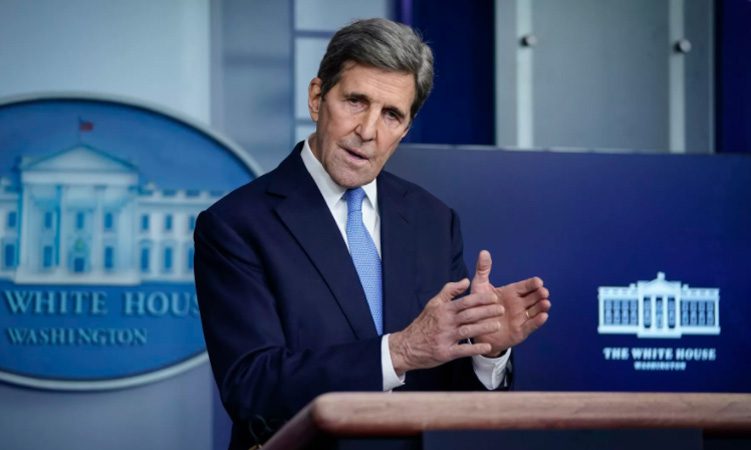(S&P Global Platts) Multiyear highs of crude oil and natural gas prices are a price of standing up to Russia for its ongoing war in Ukraine, John Kerry, US special presidential envoy for climate, said March 7 at CERAWeek by S&P Global in Houston.
The challenge is balancing the need to maintain the energy transition away from fossil fuels while still providing ample and affordable energy in the shorter term as the world emerges from a global pandemic and enters a new disruption shock with war, Kerry said.
“There may be costs and, obviously, energy is turbulent right now. It’s something we’re going to live with for a while right now,” Kerry said. “This is going to be tough, but I think, in the end, we still stand up and lay the groundwork for a stronger world.”
With risks to the exports of Russian oil, front-month NYMEX WTI hit 14-year highs March 7 near $118/b as of 1700 GMT.
ExxonMobil CEO Darren Woods said North America’s largest energy company is doing its part by increasing production in 2022 — primarily from the Permian Basin and Guyana — while planning to exit its Russia operations and investing more in energy transition projects, such as carbon capture, hydrogen, and biofuels.
“People around the world are worrying about the affordability and the availability of energy,” Woods said, citing his “deep concern” for Russia’s actions. “The impacts are being felt around the world and in our industry.”
The oil sector has gone from a historic negative pricing event early in the pandemic in 2020 to prices that are now skyrocketing.
“It’s going to be a tough time with the reductions in investments that came during the pandemic,” Woods said, noting that Russia’s invasion “complicates that even further.”
“We’re swinging from one extreme to the other,” he said.
TotalEnergies CEO Patrick Pouyanne specifically urged against banning Russian natural gas exports, arguing that global disruptions could be overwhelming.
BP, Shell, Equinor, and ExxonMobil all have said they plan to exit their Russian oil and gas investments, while TotalEnergies is sticking with its Russian investments, although pledging to avoid new spending in Russia for now.
For ExxonMobil, that means discontinuing operations at its large Sakhalin-1 oil and gas development offshore of Russia. ExxonMobil has in recent years reduced its involvement in Russia. In 2018, the US major said it was withdrawing from joint ventures set up with Rosneft following the introduction of US and EU sanctions against Russia over its role in the conflict in Crimea.
Production, emissions plans
ExxonMobil plans to bring new production online from Guyana in 2022 and grow its Permian oil and gas production by at least 25% this year. But that does not necessarily mean that ExxonMobil is raising its forecast since Russia’s invasion.
“We’re taking more of a manufacturing approach to the Permian,” Woods said, arguing that the US shale revolution has “transformed the energy map” and made the US much more energy secure than it would be otherwise — despite the current highs in prices.
In the Permian, ExxonMobil plans to grow its 2021 volumes of 460,000 boe/d by 25% in 2022 and exceed 800,000 boe/d by 2027. ExxonMobil expects to keep growing and eventually plateau at well more than 1 million boe/d from the Permian.
To aid in the energy transition, ExxonMobil also recently announced plans for a new hydrogen plant at a carbon capture hub at its Baytown campus near Houston. Woods said ExxonMobil is still awaiting some new incentives and governmental policies.
“Governments must fulfill their roles as well,” Woods said. “The call is even greater for industry and governments to collaborate.”
On that, Kerry agreed, arguing that global governments cannot solve climate change on their own. He said the US needs energy policy reforms.
“The transition is going to have to speed up,” Kerry said. “We believe we can win this battle. “We have many of the technologies we need right now, even though they’re not at scale.”
The current challenge though is that the world is behind its climate-accord goals, and the Russia-Ukraine war is only exacerbating the problems.
“The problem is we’re not doing everything we promised, and now we have this major disruption in the marketplace,” Kerry said.



